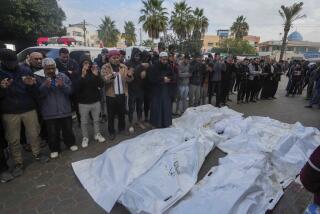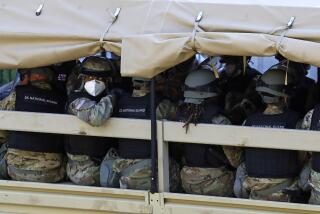Iraq Paramilitary Force Is Weighed
- Share via
BAGHDAD — As the American-led occupation authority in Iraq struggles to quell an insurgency marked by ever-bolder attacks, U.S. officials are confronting a difficult question: How much power should Iraqi forces be given to help put down the guerrillas?
Intensive discussions are underway between Iraqis and U.S. officials about a new security plan drafted by the U.S.-appointed Iraqi Governing Council that would create an all-Iraqi paramilitary force to hunt down the guerrillas -- plus gather intelligence on domestic affairs.
The plan envisions drawing officers from militias associated with Iraqi political parties and their intelligence units, giving them sweeping authority to arrest and interrogate suspects and gather intelligence. There is a possibility that they would make use of former officials of Saddam Hussein’s secret police.
The paramilitary force would operate separately from the new Iraqi police, army and other U.S.-sanctioned security squads, but little else is known about how it would function. There has been little public discussion of its size, but there are hundreds and in some cases thousands of militia members associated with Iraqi political parties.
Although U.S. officials have been eager to give Iraqis more responsibility for security -- stressing in recent weeks efforts to train tens of thousands of police, soldiers and border-patrol officers -- the Bush administration’s objections to several key elements of the paramilitary force plan highlight the dilemmas of such a handoff.
Iraqis argue that they are better equipped than foreign troops to root out the armed opposition, and they note that most of the victims of attacks by insurgents have been Iraqis.
“The governing council believes we can’t establish security and peace in Iraq unless [this responsibility] is given to the Iraqis,” Jalal Talabani, who heads the Patriotic Union of Kurdistan political party, said Wednesday at his first news conference as president of the council. The presidency rotates every month among nine of the council’s 24 members.
The council, Talabani said, has presented a still mostly secret blueprint for a security overhaul to L. Paul Bremer III, head of the U.S.-led occupation administration. The plan recommends creating the Iraqi-led paramilitary force along with other steps, such as recruiting mid-ranking officers from Hussein’s army -- those below the level of colonel -- as well as retired officers to return to the military in leadership positions.
U.S. officials have strongly resisted the notion of an Iraqi paramilitary force, arguing that it could have some of the worst qualities of Hussein’s Mukhabarat, or secret police, and that it could devolve into competing factions controlled by Iraq’s five most-organized political parties. Coalition officials also fear that the force could be used to stifle criticism of the political parties from which the force would draw many members.
With no indication of when U.S. and other foreign forces may withdraw from Iraq, chain of command is yet another sensitive issue.
“You can’t in a democracy have armed forces which are under the control of political parties,” Walter Slocombe, the U.S.-led coalition’s director of national security and defense, said Wednesday. “The issue is who would be in command? Who would be in control?”
The members of the Governing Council lobbying hardest for the paramilitary force are those who lead the five most-organized and well-financed political parties and who led opposition to Hussein before his ouster.
The five parties are the Patriotic Union of Kurdistan and the Kurdish Democratic Party, both of which receive money from the United States; the Iraqi National Accord, which has long-standing ties to the CIA; the Iraqi National Congress, which is led by Ahmad Chalabi and has been backed by the State Department and the Pentagon; and the Supreme Council for the Islamic Revolution in Iraq, a Shiite Muslim group with backing from Iran.
Because of their opposition to Hussein’s regime, these groups have intelligence networks that can track Hussein loyalists and know how they work. Unlike most coalition military police or soldiers, their members speak Arabic and can recognize the accents of non-Iraqi Arabs, making them better at tracking foreign fighters.
U.S. officials believe the insurgency in Iraq includes Hussein loyalists and foreign fighters, as well as Iraqis angry about the occupation. Gathering intelligence on the insurgents has been one of the biggest challenges for the U.S.-led coalition forces.
“Do you really think an American soldier from Louisiana can police [Madinat] al Thawra?” asked Iyad Allawi, a Governing Co uncil member and leader of the Iraqi National Accord, referring to the poor Baghdad neighborhood also known as Sadr City, where about 2 million Shiite Muslims live.
Allawi said he would have no problem with hiring former members of Hussein’s secret police, as long as it was clear that they would have no political power and that their purpose would be to provide information and tips to those working for the new paramilitary organization.
The proposal has generated a buzz in the Arab world, where secret police are central to the survival of most regimes. A report in Al Ittihad, a newspaper in the United Arab Emirates, alleged that the Governing Council is striving to create “an ameliorated copy of Saddam’s Mukhabarat ... with 1,000 secret agents.”
The Governing Council has pushed the proposal relentlessly. “We need an army, full stop. We need an intelligence service, full stop,” said Allawi.
Coalition officials said they were listening but certain conditions would have to be met. On Wednesday they denied reports that Bremer had agreed to drop his longtime opposition to a strong paramilitary force.
“We are in discussion with people on the Governing Council who are advocating this,” Slocombe said. “As to what they have in mind, we have neither accepted it or rejected it.”
There has been considerable back and forth about the proposal between coalition officials in Iraq who are keenly aware of the enormity of the security problems and Pentagon officials who are reluctant to cede any control of vetting, training and organizing to Iraqis.
“There appears to have been some measure of misunderstanding here that we think the [Coalition Provisional Authority] has cleared up,” said an administration official in Washington close to the discussions.
Dan Senor, Bremer’s spokesman, said in a statement: “Ambassador Bremer has stated that he welcomes intelligence cooperation and would be open to discussing the proposal for creation, in limited numbers, of new law enforcement elements. He has no objection in principle to such elements, so long as his concerns are addressed.
“To date, however, we are still learning whether the advocates of a new policy are prepared to work within this framework.”
Bremer laid out five conditions for approval of such a force: It would have to be constituted as a single, national force; it would have to coordinate with the coalition and the rest of the Iraqi government; members would have to enroll on an individual basis, not as members of an existing force or militia; members would have to undergo extensive training in policing and human rights; and members would have to be carefully vetted to ensure that none had links to extremists or excessively close ties to the previous regime.
As debate continued Wednesday over the paramilitary force proposal, guerrillas struck in the northern city of Mosul, attacking three U.S. military convoys with rocket-propelled grenades and roadside bombs. Three Iraqi civilians were killed and five Americans were wounded, U.S. military and hospital officials said.
Times staff writer Doyle McManus in Washington contributed to this report.
More to Read
Sign up for Essential California
The most important California stories and recommendations in your inbox every morning.
You may occasionally receive promotional content from the Los Angeles Times.













